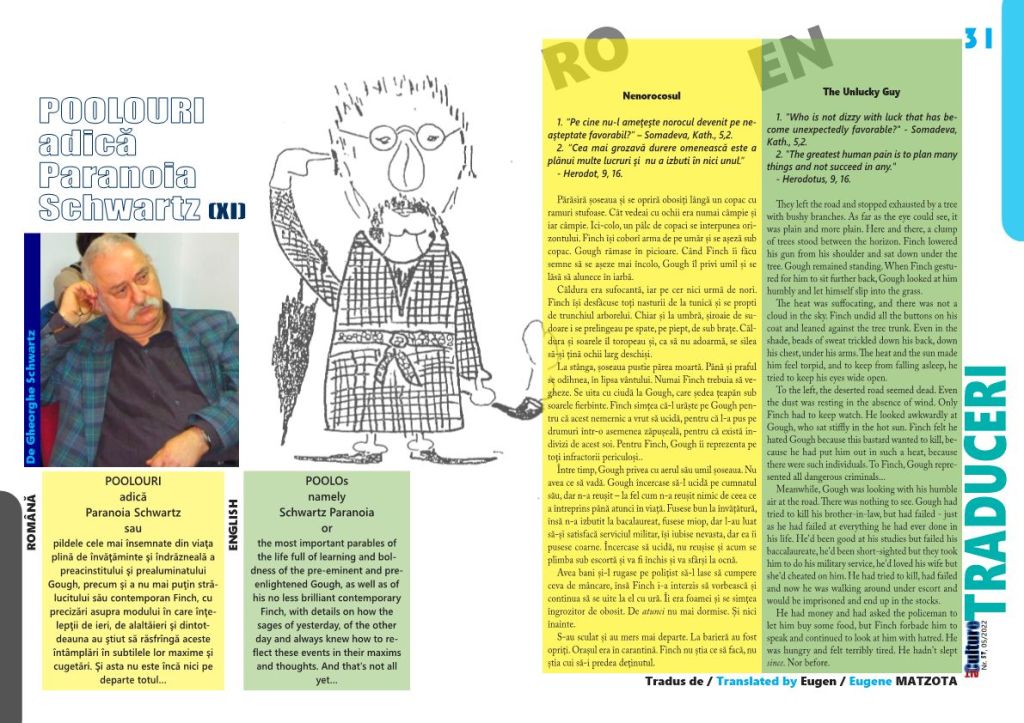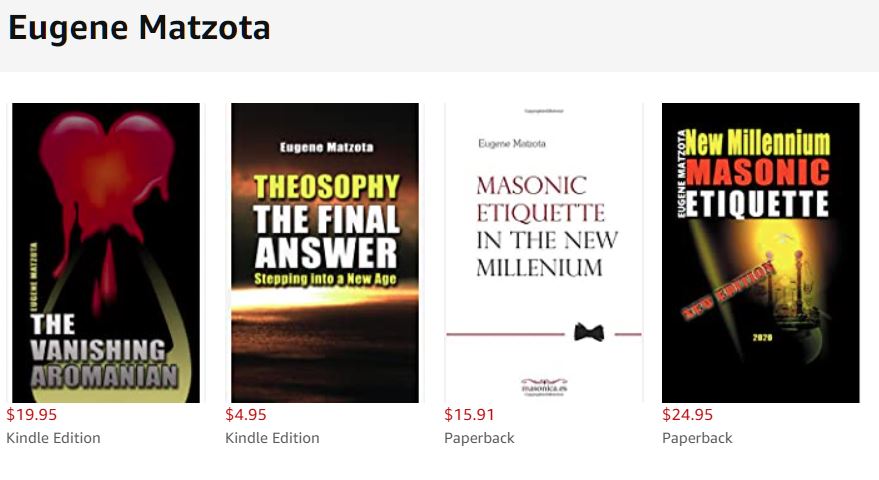ALTCULTURE MAGAZINE ||| 57 ||| 5/2022 |||
POOLOURI adică Paranoia Schwartz (XI)
De Gheorghe Schwartz
Tradus de / Translated by
Eugen / Eugene MATZOTA
ECOULTOUR le mulțumește tuturor celor care sunt alături în lupta pentru educație și cultură!
POOLOURI
adică
Paranoia Schwartz
sau
pildele cele mai însemnate din viața plină de învățăminte și îndrăzneală a preacinstitului și prealuminatului Gough, precum și a nu mai puțin strălucitului său contemporan Finch, cu precizări asupra modului în care înțelepții de ieri, de alaltăieri și dintotdeauna au știut să răsfrîngă aceste întâmplări în subtilele lor maxime și cugetări. Și asta nu este încă nici pe departe totul…
Nenorocosul
- “Pe cine nu-l ameţeşte norocul devenit pe neaşteptate favorabil?” – Somadeva, Kath., 5,2.
- “Cea mai grozavă durere omenească este a plănui multe lucruri şi nu a izbuti în nici unul.”
Herodot, 9, 16.
Părăsiră şoseaua şi se opriră obosiţi lângă un copac cu ramuri stufoase. Cât vedeai cu ochii era numai câmpie şi iar câmpie. Ici-colo, un pâlc de copaci se interpunea orizontului. Finch îşi coborî arma de pe umăr şi se aşeză sub copac. Gough rămase în picioare. Când Finch îi făcu semne să se aşeze mai încolo, Gough îl privi umil şi se lăsă să alunece în iarbă.
Căldura era sufocantă, iar pe cer nici urmă de nori. Finch îşi desfăcuse toţi nasturii de la tunică şi se propti de trunchiul arborelui. Chiar şi la umbră, şiroaie de sudoare i se prelingeau pe spate, pe piept, de sub braţe. Căldura şi soarele îl toropeau şi, ca să nu adoarmă, se silea să-şi ţină ochii larg deschişi.
La stânga, şoseaua pustie părea moartă. Până şi praful se odihnea, în lipsa vântului. Numai Finch trebuia să vegheze. Se uita cu ciudă la Gough, care şedea ţeapăn sub soarele fierbinte. Finch simţea că-l urăşte pe Gough pentru că acest nemernic a vrut să ucidă, pentru că l-a pus pe drumuri într-o asemenea zăpuşeală, pentru că există indivizi de acest soi. Pentru Finch, Gough îi reprezenta pe toţi infractorii periculoşi..
Între timp, Gough privea cu aerul său umil şoseaua. Nu avea ce să vadă. Gough încercase să-l ucidă pe cumnatul său, dar n-a reuşit – la fel cum n-a reuşit nimic de ceea ce a întreprins până atunci în viaţă. Fusese bun la învăţătură, însă n-a izbutit la bacalaureat, fusese miop, dar l-au luat să-şi satisfacă serviciul militar, îşi iubise nevasta, dar ea îi pusese coarne. Încercase să ucidă, nu reuşise şi acum se plimba sub escortă şi va fi închis şi va sfârşi la ocnă.
Avea bani şi-l rugase pe poliţist să-l lase să cumpere ceva de mâncare, însă Finch i-a interzis să vorbească şi continua să se uite la el cu ură. Îi era foamei şi se simţea îngrozitor de obosit. De atunci nu mai dormise. Şi nici înainte.
S-au sculat şi au mers mai departe. La barieră au fost opriţi. Oraşul era în carantină. Finch nu ştia ce să facă, nu ştia cui să-i predea deţinutul.
Au mers lungul drum înapoi. De astă dată pe ploaie S-au aşezat iarăşi: Finch sub copac, Gough mai încolo. Apoi un fulger a lovit copacul şi l-a omorît pe Finch. Gough s-a întors în oraş. Spunea oricui că trebuie să fie judecat fiindcă a încercat să ucidă, dar oamenii tocmai îşi îngropau morţii. Gough fiind singurul om cu carte dintre toţi câţi au rămas în viaţă, a fost numit primar. Însă el susţinea că a vrut să ucidă şi că trebuie să fie judecat.
Înainte fusese contabil. Acum l-au făcut şi directorul fabricii.
– Am vrut să ucid, repeta Gough, n-am reuşit şi am fost arestat. Acum sunt directorul fabricii şi primarul oraşului. Cum o să se termine toate astea?
Într-o zi veni cumnatul său la el, îl îmbrăţişă şi-l rugă să se împace. Şi veni şi nevasta lui Gough, cu un domn ce-i făcea curte, un domn foarte influent în parlament. I-a primit pe toţi şi le-a dat casă şi masă, cumnatului cu cei patru copii şi soţiei şi domnului foarte influent în parlament, precum şi unui ofiţer ce fusese pe vremuri ofiţer în marină (dar care n-a putut să dovedească acest lucru niciodată).
Gough câştiga bine şi, pe deasupra, a mai primit şi o moştenire de la o mătuşă vitregă, de care habar nu avusese până atunci.
Apoi l-au făcut prefect.
Plătise mult în stânga şi în dreapta pentru a ajunge prefect. Iar când a reuşit, l-a chemat pe cumnatul cu cei patru copii şi pe nevasta cu domnul foarte influent în parlament şi pe presupusul fost ofiţer de marină – care, însă, n-a putut veni, fiind ţintuit la pat de o criză de ficat, unde se plângea că avea pietre, deşi medicii n-au confirmat diagnosticul niciodată. Şi când au fost cu toţii acolo şi l-au felicitat, Gough le-a mulţumit.
Apoi, s-a aşezat tacticos la biroul său pentru a-şi întocmi mandatul de arestare.
Tribunalul îl achită din lipsă de probe.
– De ce? îl întrebă pe cel mai înţelept om din prefectura sa.
– Înainte n-aveai destui bani spre a putea scăpa de rigorile legii, acum ai prea mulţi pentru ca ea să te mai poată atinge.
Dar Gough nu-l putea înţelege. Era, de acum, şi pentru aceasta prea bogat.
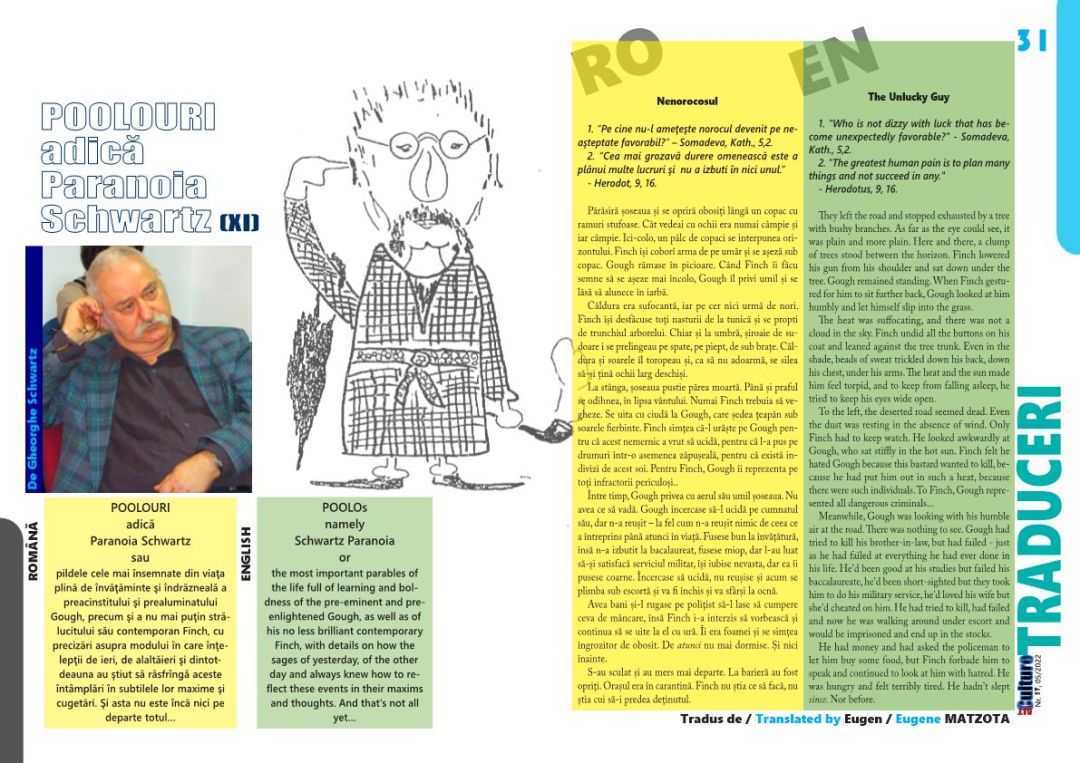
Contabilul
„Banii sunt suflet pentru sărmanii muritori” – Hesiod, Op., 686.
Gough s-a pomenit în situaţia în care n-a mai avut nici un bănuţ pentru mâncarea celor şapte copilaşi. Aşa că s-a rugat la Dumnezeu şi Acesta s-a milostivit şi i-a permis să-şi ia atâţia bani câţi poate număra. Gough a numărat o zi întreagă şi parcă nu i-a venit să se mai oprească. Păi, nu era păcat să piardă o asemenea ocazie?
Seara l-a întrebat pe Dumnezeu dacă poate face o pauză în număratul banilor, însă Domnul i-a răspuns că un om nu se întâlneşte decât o singură dată cu o asemenea pleaşcă, aşa că să facă bine să numere până la capăt, cât vrea el, să-şi ia banii şi să le dea de mâncare copilaşilor.
– Şi haine nu le trebuie copiilor?
Dumnezeu s-a supărat şi nu i-a mai răspuns nimic nesătulului.
Gough a continuat să numere bani, dar, obosit fiind, I-a mai făcut o propunere lui Dumnezeu:
– Am obosit, Doamne, se căină el, nu s-ar putea să emiţi bancnote cu valoare mai mare, ca să mă pot culca şi eu, după ce am tot numărat hârtiile astea de nimic de patrusprezece ore?
Dumnezeu era pe punctul de a se înfuria de-a binelea. Acel pârlit de Gough întrecea orice măsură!
După trei zile, vreme în care n-a dormit şi n-a mâncat nimic, istovit până aproape de leşin, Gough, cu o voce sfârşită, s-a supărat şi mai mult pe Domnul:
– E limpede că eu am să mor în curând. Nu mai am salivă în gură de cât mi-am muiat degetul pentru a putea dezlipi afurisitul ăsta de mărunţiş. Copilaşii o să piară de foame, fiicele o să rămână fete bătrâne, casa făcută cu atâta trudă de bunicul Gough se va dărâma şi ea. Şi eu nu ţi-am cerut, Doamne, decât nişte bani pentru a le da de mâncare copilaşilor.
– Ţi-am dat bani, s-a auzit Vocea din Ceruri. Cheltuieşte-i!
– Dar pentru asta ar trebui să mă opresc din numărat, banii s-ar duce şi copilaşii ar rămâne tot flămânzi.
Domnul a tăcut din nou, iar bietul Gough, abia mai mişcându-şi degetele, fără salivă în gură şi lihnit de foame şi de oboseală, continuă să numere bancnotele acelea atât de devalorizate.
Până la urmă, lui Dumnezeu I s-a făcut milă: nu de acest nou Midas, lacom şi incapabil de a se opri din număratul banilor, ci de copilaşii nevinovaţi. Cu o voce blândă, a făcut următorul compromis:
– De azi încolo, poţi să numeri bani cât vrei, noaptea ai voie să te odihneşti, iar de sabat te vei gândi la mine. Până vei crede că ai numărat destul, vei primi lunar un avans din sumă, ca să poţi supravieţui, ca să aibă copilaşii ce mânca, fetele o dotă cuviincioasă pentru când se vor mărita, iar casa să rămână şi ea în picioare.
Gough se arătă mulţumit. Tratativele cu Domnul s-au finalizat mulţumitor, aşa că a continuat să numere bani toată viaţa şi să-şi ducă traiul modest, dar cinstit, până la adânci bătrâneţi. Oamenii l-au numit “contabilul”.
Lecţia de economie politică
“Când doi fac acelaşi lucru, nu-i acelaşi lucru.” – Syrus, Seneca, Epistole.
Domnul Gough stătea de jumătate de oră şi-l urmărea pe Finch pescuind. Era o adevărată plăcere să-l vezi pe omul ăsta, trecut de prima tinereţe, neras, jerpelit, însă totuşi atât de destins în activitate. Se vedea de la o poştă că Finch e un adevărat profesionist. Şi, într-adevăr, domnul Gough a putut constata cum în acea jumătate de oră, Finch scoase la mal trei peşti frumoşi, trei exemplare superbe. Alături, mai mulţi pescari amatori se străduiau în zadar să prindă peşte dintr-o mare care, pentru ei, părea să fie lipsită de orice vietate.
Dar, spre surprinderea domnului Gough, după ce pescuise exemplarul cel mai frumos – şi cu câtă uşurinţă se agăţau peştii de cârligul lui Finch, spre disperarea celorlalţi pescari, profesionistul îşi adună lucrurile, se retrase la umbra unui copac şi se culcă. În doar câteva clipe, aţipi.
“Uite, gândi Gough, de ce sunt prăpădiţii ăştia atât de săraci… Dacă n-ar fi atât de leneşi şi ar lucra conştiincios, în câteva luni li s-ar ameliora simţitor situaţia.” Tot gândindu-se, domnul Gough se enervă de-a binelea. Până la urmă, nu mai răbdă, se îndreptă spre copacul sub care dormea marele pescar şi tuşi de câteva ori. Finch se trezi.
– Ascultă, îi spuse domnul Gough cu blândeţe nefericitului. Eu vreau să îţi luminez mintea.
– Luminaţi-mi-o.
– Uite, zise domnul Gough, încurajat de admirabila receptivitate a pescarului. (Unii oameni sunt plini de bunăvoinţă. Păcat că, de cele mai multe ori nu este cine să-i lumineze…) Uite, tu ai prins acum trei peşti. Trei, nu? Acum să-mi spui de ce te-ai oprit din muncă?
– Păi, ce era să mai fac?
– Să prinzi mai mulţi peşti!
– De ce?
– Cum de ce?! Ca să-i mănânci.
– Dar mie şi neveste-mi ne ajung câţi am prins. Ba, mi-e tare teamă să nu trebuiască să mai şi aruncăm unul.
– De ce să-l arunci?! Poţi să-l vinzi!
– Da? De ce?
– Să-ţi cumperi o undiţă mai bună.
Finch se scărpină după cap.
– Mda, recunoscu el, ar fi o soluţie, Dar o undiţă mai bună e mult mai scumpă ca un peşte.
– Vezi? De aia îţi spun că nu trebuia să te opreşti din munca ta! Tu eşti pescar? Eşti! Ce trebuie să faci? Să pescuieşti. De aia eşti pescar. Deci, dacă mai lucrai o oră, puteai să-ţi cumperi din peştele obţinut o undiţă mai bună.
– Da? Mda… Dar de ce-mi trebuie mie o undiţă mai bună?
– Cu o undiţă mai bună ai prinde mai mult peşte. Şi asta cu acelaşi efort.
– Asta-i clar, spuse Finch. Dar de ce să prind mai mult peşte?
– Ca să-ţi cumperi o undiţă. La fel de bună.
– Încă una? De ce?
– Ca să prinzi şi mai mult peşte. Cu două undiţe bune, un pescar ca dumneata ar putea scoate… ohohoho!
– M-aş descurca eu, nu zic nu… Dar de ce să prind mai mult peşte?
– Pentru ca să-l vinzi! Nu înţelegi, omule? Din banii primiţi, în scurt timp, ai putea să-ţi cumperi o barcă.
– Ehei! Cu o barcă m-aş duce cu ea goală şi m-aş întoarce cu ea plină.
– Vezi? Vezi c-ai priceput? Ai putea prinde atât peşte încât în câteva luni să-ţi cumperi un vaporaş.
– Da? Aş putea, admise Finch, mai scărpinându-se o dată după cap. Un entuziasm încă necunoscut îl cuprinse. Dar unda trecu la fel de repede pe cum a venit. Şi ce să fac eu cu un vaporaş?
– Cu un vaporaş? Dacă ai avea un vaporaş, ai putea să-ţi angajezi câţiva pescari, băieţi de nădejde, să pescuiască ei în locul dumitale.
– De ce să pescuiască ei în locul meu?
– Pentru că dumneata ai avea bani.
– Da? Şi ce să fac cu banii?
– Dar nu înţelegi? Domnul Gough era de-a dreptul revoltat în faţa unui caz atât de evident de lipsă de înţelegere a economiei politice. Ei ar pescui, iar dumneata ai putea să te culci şi să dormi.
– Da? mai întrebă pentru ultima dată Finch. Dar, vă rog frumos, aşa ce fac? Şi se culcă la loc, protejat de copacul bătrân şi noduros, îşi aşeză pălăria jerpelită peste faţa nerasă şi, după câteva clipe, începu să sforăie.
POOLOs
namely
Schwartz Paranoia
or
the most important parables of the life full of learning and boldness of the pre-eminent and pre-enlightened Gough, as well as of his no less brilliant contemporary Finch, with details on how the sages of yesterday, of the other day and always knew how to reflect these events in their maxims and thoughts. And that’s not all yet…
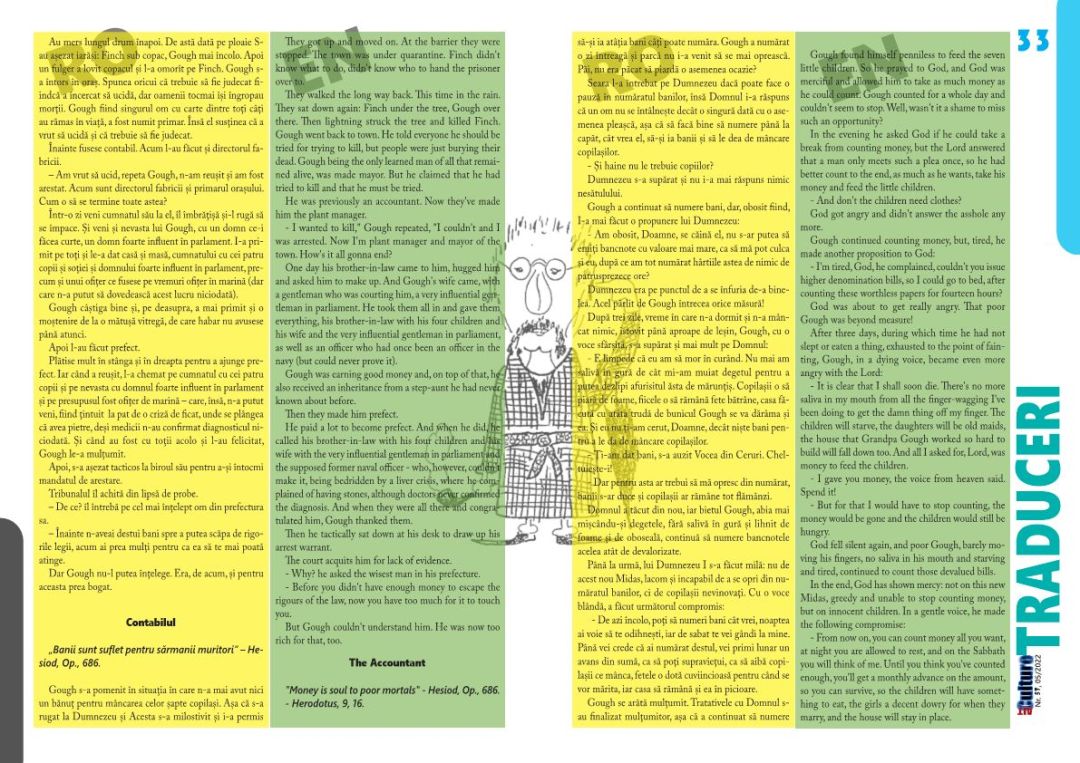
The Unlucky Guy
1. „Who is not dizzy with luck that has become unexpectedly favorable?” – Somadeva, Kath., 5,2.
2. „The greatest human pain is to plan many things and not succeed in any.”
Herodotus, 9, 16.
They left the road and stopped exhausted by a tree with bushy branches. As far as the eye could see, it was plain and more plain. Here and there, a clump of trees stood between the horizon. Finch lowered his gun from his shoulder and sat down under the tree. Gough remained standing. When Finch gestured for him to sit further back, Gough looked at him humbly and let himself slip into the grass.
The heat was suffocating, and there was not a cloud in the sky. Finch undid all the buttons on his coat and leaned against the tree trunk. Even in the shade, beads of sweat trickled down his back, down his chest, under his arms. The heat and the sun made him feel torpid, and to keep from falling asleep, he tried to keep his eyes wide open.
To the left, the deserted road seemed dead. Even the dust was resting in the absence of wind. Only Finch had to keep watch. He looked awkwardly at Gough, who sat stiffly in the hot sun. Finch felt he hated Gough because this bastard wanted to kill, because he had put him out in such a heat, because there were such individuals. To Finch, Gough represented all dangerous criminals…
Meanwhile, Gough was looking with his humble air at the road. There was nothing to see. Gough had tried to kill his brother-in-law, but had failed – just as he had failed at everything he had ever done in his life. He’d been good at his studies but failed his baccalaureate, he’d been short-sighted but they took him to do his military service, he’d loved his wife but she’d cheated on him. He had tried to kill, had failed and now he was walking around under escort and would be imprisoned and end up in the stocks.
He had money and had asked the policeman to let him buy some food, but Finch forbade him to speak and continued to look at him with hatred. He was hungry and felt terribly tired. He hadn’t slept since. Nor before.
They got up and moved on. At the barrier they were stopped. The town was under quarantine. Finch didn’t know what to do, didn’t know who to hand the prisoner over to.
They walked the long way back. This time in the rain. They sat down again: Finch under the tree, Gough over there. Then lightning struck the tree and killed Finch. Gough went back to town. He told everyone he should be tried for trying to kill, but people were just burying their dead. Gough being the only learned man of all that remained alive, was made mayor. But he claimed that he had tried to kill and that he must be tried.
He was previously an accountant. Now they’ve made him the plant manager.
I wanted to kill,” Gough repeated, „I couldn’t and I was arrested. Now I’m plant manager and mayor of the town. How’s it all gonna end?
One day his brother-in-law came to him, hugged him and asked him to make up. And Gough’s wife came, with a gentleman who was courting him, a very influential gentleman in parliament. He took them all in and gave them everything, his brother-in-law with his four children and his wife and the very influential gentleman in parliament, as well as an officer who had once been an officer in the navy (but could never prove it).
Gough was earning good money and, on top of that, he also received an inheritance from a step-aunt he had never known about before.
Then they made him prefect.
He paid a lot to become prefect. And when he did, he called his brother-in-law with his four children and his wife with the very influential gentleman in parliament and the supposed former naval officer – who, however, couldn’t make it, being bedridden by a liver crisis, where he complained of having stones, although doctors never confirmed the diagnosis. And when they were all there and congratulated him, Gough thanked them.
Then he tactically sat down at his desk to draw up his arrest warrant.
The court acquits him for lack of evidence.
Why? he asked the wisest man in his prefecture.
Before you didn’t have enough money to escape the rigours of the law, now you have too much for it to touch you.
But Gough couldn’t understand him. He was now too rich for that, too.
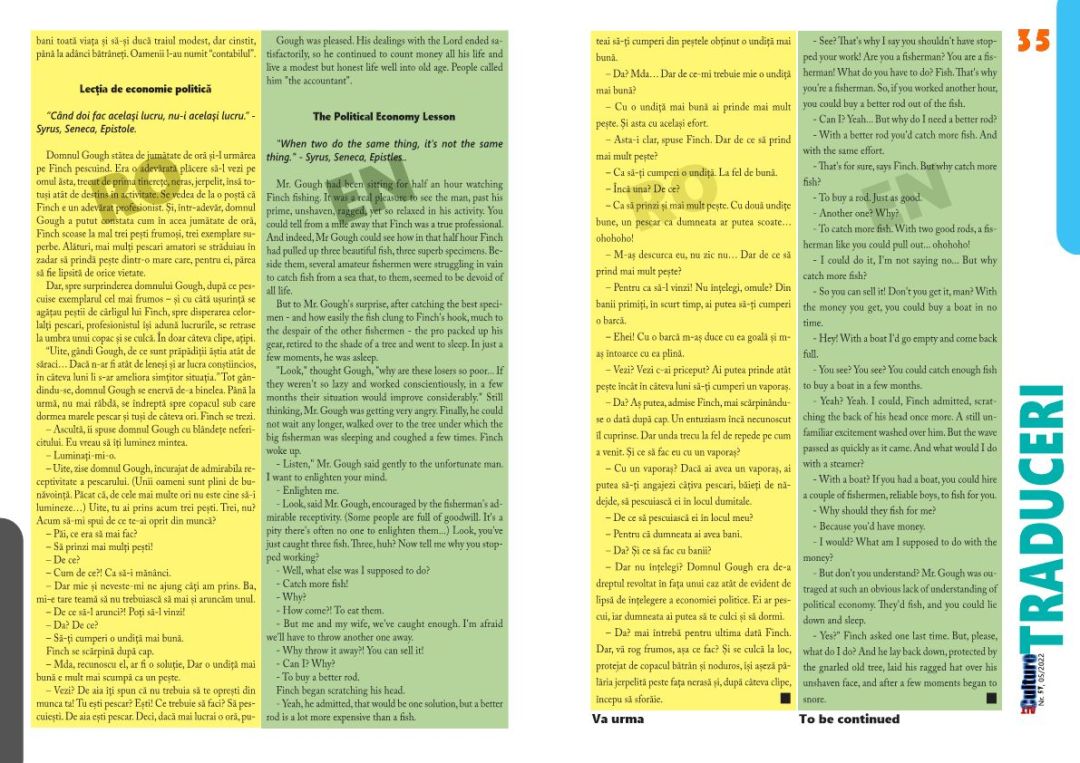
The Accountant
„Money is soul to poor mortals” – Hesiod, Op., 686.
Herodotus, 9, 16.
Gough found himself penniless to feed the seven little children. So he prayed to God, and God was merciful and allowed him to take as much money as he could count. Gough counted for a whole day and couldn’t seem to stop. Well, wasn’t it a shame to miss such an opportunity?
In the evening he asked God if he could take a break from counting money, but the Lord answered that a man only meets such a plea once, so he had better count to the end, as much as he wants, take his money and feed the little children.
– And don’t the children need clothes?
God got angry and didn’t answer the asshole any more.
Gough continued counting money, but, tired, he made another proposition to God:
– I’m tired, God, he complained, couldn’t you issue higher denomination bills, so I could go to bed, after counting these worthless papers for fourteen hours?
God was about to get really angry. That poor Gough was beyond measure!
After three days, during which time he had not slept or eaten a thing, exhausted to the point of fainting, Gough, in a dying voice, became even more angry with the Lord:
– It is clear that I shall soon die. There’s no more saliva in my mouth from all the finger-wagging I’ve been doing to get the damn thing off my finger. The children will starve, the daughters will be old maids, the house that Grandpa Gough worked so hard to build will fall down too. And all I asked for, Lord, was money to feed the children.
– I gave you money, the voice from heaven said. Spend it!
But for that I would have to stop counting, the money would be gone and the children would still be hungry.
God fell silent again, and poor Gough, barely moving his fingers, no saliva in his mouth and starving and tired, continued to count those devalued bills.
In the end, God has shown mercy: not on this new Midas, greedy and unable to stop counting money, but on innocent children. In a gentle voice, he made the following compromise:
– From now on, you can count money all you want, at night you are allowed to rest, and on the Sabbath you will think of me. Until you think you’ve counted enough, you’ll get a monthly advance on the amount, so you can survive, so the children will have something to eat, the girls a decent dowry for when they marry, and the house will stay in place.
Gough was pleased. His dealings with the Lord ended satisfactorily, so he continued to count money all his life and live a modest but honest life well into old age. People called him „the accountant”.
The Political Economy Lesson
„When two do the same thing, it’s not the same thing.” –
Syrus, Seneca, Epistles.
Mr. Gough had been sitting for half an hour watching Finch fishing. It was a real pleasure to see the man, past his prime, unshaven, ragged, yet so relaxed in his activity. You could tell from a mile away that Finch was a true professional. And indeed, Mr Gough could see how in that half hour Finch had pulled up three beautiful fish, three superb specimens. Beside them, several amateur fishermen were struggling in vain to catch fish from a sea that, to them, seemed to be devoid of all life.
But to Mr. Gough’s surprise, after catching the best specimen – and how easily the fish clung to Finch’s hook, much to the despair of the other fishermen – the pro packed up his gear, retired to the shade of a tree and went to sleep. In just a few moments, he was asleep.
„Look,” thought Gough, „why are these losers so poor… If they weren’t so lazy and worked conscientiously, in a few months their situation would improve considerably.” Still thinking, Mr. Gough was getting very angry. Finally, he could not wait any longer, walked over to the tree under which the big fisherman was sleeping and coughed a few times. Finch woke up.
– Listen,” Mr. Gough said gently to the unfortunate man. I want to enlighten your mind.
– Enlighten me.
– Look, said Mr. Gough, encouraged by the fisherman’s admirable receptivity. (Some people are full of goodwill. It’s a pity there’s often no one to enlighten them…) Look, you’ve just caught three fish. Three, huh? Now tell me why you stopped working?
– Well, what else was I supposed to do?
– Catch more fish!
– Why?
– How come?! To eat them.
But me and my wife, we’ve caught enough. I’m afraid we’ll have to throw another one away.
– Why throw it away?! You can sell it!
– Can I? Why?
– To buy a better rod.
Finch began scratching his head.
-Yeah, he admitted, that would be one solution, but a better rod is a lot more expensive than a fish.
– See? That’s why I say you shouldn’t have stopped your work! Are you a fisherman? You are a fisherman! What do you have to do? Fish. That’s why you’re a fisherman. So, if you worked another hour, you could buy a better rod out of the fish.
– Can I? Yeah… But why do I need a better rod?
– With a better rod you’d catch more fish. And with the same effort.
– That’s for sure, says Finch. But why catch more fish?
– To buy a rod. Just as good.
– Another one? Why?
– To catch more fish. With two good rods, a fisherman like you could pull out… ohohoho!
– I could do it, I’m not saying no… But why catch more fish?
– So you can sell it! Don’t you get it, man? With the money you get, you could buy a boat in no time.
– Hey! With a boat I’d go empty and come back full.
– You see? You see? You could catch enough fish to buy a boat in a few months.
– Yeah? Yeah. I could, Finch admitted, scratching the back of his head once more. A still unfamiliar excitement washed over him. But the wave passed as quickly as it came. And what would I do with a steamer?
– With a boat? If you had a boat, you could hire a couple of fishermen, reliable boys, to fish for you.
– Why should they fish for me?
– Because you’d have money.
– I would? What am I supposed to do with the money?
– But don’t you understand? Mr. Gough was outraged at such an obvious lack of understanding of political economy. They’d fish, and you could lie down and sleep.
– Yes?” Finch asked one last time. But, please, what do I do? And he lay back down, protected by the gnarled old tree, laid his ragged hat over his unshaven face, and after a few moments began to snore.

